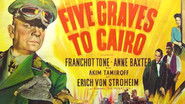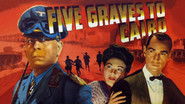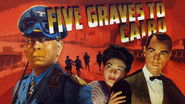classicsoncall
It's remarkable how interesting a war time espionage film can be, while at the same time requiring major suspension of disbelief throughout the story for various reasons. The major one here for me related to the character of actor Franchot Tone impersonating a German undercover spy. Throughout the entire film, not one German officer or soldier thought it appropriate to address him in the mother tongue. There were plenty of opportunities, as German was used sporadically in the story at various times. At least in the interest of being cautious with captured British officers around, one would think Field Marshal Rommel (Erich von Stroheim) or Lieutenant Schwengler (Peter van Eyck) might have addressed Bramble/Davos in German, especially in the early going when all the characters at the Hotel Empress would have come under suspicion.Which brings me to my next point. You probably wouldn't need to know a thing about General Rommel to question why he would speak freely of German military strategy in the presence of English officers. I don't think so. As for the casting of Erich von Stroheim as Rommel, there was no physical resemblance to speak of. My idea for the role would have been someone like Conrad Veidt who portrayed Major Strasser in the Bogart film "Casablanca". Although with the timing of this picture, shooting schedules might have overlapped between the two.One more thing before I'm through. I thought the gimmick with the map and the letters spelling out 'EGYPT' was a fairly clever plot element, but there again, a bit of thought brings a big question mark. Given that any of the letters on the map might have represented an area covering hundreds of square miles, the resolution for the Allies wouldn't have been as precise as the story suggests. Even given a general area in which to unearth the hidden military supplies, a fair amount of time would have been needed to discover a weapons cache.Still, even with all the perceived glitches in the story, I fond the story intriguing enough to hold my attention. All the principals did a good job, and I particularly liked the character of Farid (Akim Tamiroff), who was downright hilarious at times under stressful circumstances. I was also moved by Bramble's response to the Alsatian maid Mouche (Anne Baxter), who had an overbearing concern for her younger brother who was a prisoner of the Nazis. It appeared Bramble made his point when he stated - "It's not one brother that matters. It's a million brothers".
Spikeopath
Five Graves to Cairo is directed by Billy Wilder who also co-adapts the screenplay with Charles Brackett. It's based on the Lajos Biró play Hotel Imperial. It stars Franchot tone, Anne Baxter, Akim Tamiroff, Erich von Stroheim and Peter Van Eyck. Music is by Miklós Rózsa and cinematography by John Seitz.Tone plays John Bramble, the sole survivor of a British tank division who stumbles into a near deserted desert town only to find it suddenly fill up with Field Marshall Rommel and his troops. Assuming the identity of a dead waiter at the hotel run by Farid (Tamiroff), Bramble gains the trust of everyone only to learn that the waiter he is pretending to be was actually a secret agent for the Germans. If he can keep up the pretence and not get found out, Bramble could have great impact on the North Africa Campaign.A cracker is this, an early Billy Wilder film that thrives on tension and clever plotting while pulsing with great literate strength. Cast are more than capable of making the material work as well, with Tone nicely restrained, Baxter very touching (decent French accent too) and Von Stroheim a ball of emotions as a complex laden Rommel. Tech credits are grade A stuff, the sound department and Seitz's photography especially lifting the picture still further to classic status. This is no high energy war movie, it's character driven but all the better for it, with Wilder even slotting in moments of humour to sit alongside the sharper edges of the dialogue. From the sombre opening of a tank aimlessly trudging across the desert, its pilot hanging dead from the turret, to a very touching finale involving a parasol, Wilder's movie holds the attention greatly. A masterful story brought to us by a master director. 8/10
sogs
A really poor view of the events in North Africa during this time is presented in true Hollywood irrelevance. Rommel, of course was nothing like this portrayal given from Von Stroheim. The desert war was a remarkably clean one, given the period and executing hotel maids was not really one of Rommel's personal involvements at any given stage. The ludicrous plot centralizing on Tones spy role is more comedy than reality. Its a low score here for me as given the time, it would have been better to have portrayed some sense of fact than fiction. Flag waving manure as are so many for this period but this seems to be one that could have graduated above the rest. Had the effort been made. It failed.Avoid.
jpdoherty
The films of writer, producer director Billy Wilder are regarded as some of the finest works of cinematic art in the history of motion pictures. Wilder, who with a handful of film pioneers such as John Ford, Howard Hawks, Anthony Mann, John Houston and Henry Hathaway et al forged and created a unique style in the production of films that today are looked upon as enduring, inspired and unsurpassed classics. In the case of Wilder such dramatic and sublime fare as "Double Indemnity" (1944), "Ace In the Hole" (1951) and Hollywood's greatest film about itself "Sunset Boulevard" (1950). Plus his comedies like "The Apartment" (1960) and "Some Like It Hot" (1959) - regarded by many to be the funniest film ever made - can never, let's face it, be equalled. There is a timelessness and ageless quality about them that reaches out to anyone who watches them regardless of their generation. Contemporory film maker Cameron Crowe observed "Wilder's work is a treasure trove of flesh and blood individuals, all wonderfully alive".It is hard to believe that one of Wilder's earliest Hollywood efforts FIVE GRAVES TO CAIRO was made in 1943. It seems to be a much later film in look, approach and concept. Yet this quite intriguing spy drama was the result of the day's headlines being utilized by Wilder for the movie's scenario. Based on Lajos Biro's play "Hotel Imperial" it was superbly written by Charles Brackett and Wilder and sharply photographed in monochrome by John Seitz. It was produced by Brackett for Paramount Pictures and was masterfully directed by Wilder. Franchot Tone is British tank Corporal John Bramble who stumbles into a Sahara oasis hotel after crawling through the desert during the North African campaign in 1942. The Germans also arrive at virtually the same time headed by none other than the infamous German Field Marshall Erwin Rommel (Erich Von Stroheim). Rommel and his command take up residence in the hotel run by nervous local Arab Farid (Akim Tamiroff) and an attractive Alsatian maid Mouche (Anne Baxter). To conceal his identity Bramble pretends to be the hotel waiter and as such tries to find out from the formidable quest exactly where on the map the German arms dumps are located. With help from Farid and the maid and gaining Rommel's confidence he eventually acquires the information but not before Mouche sacrifices herself so that Bramble can leave and get back to the British lines.Performances are uniformly excellent! Tone gives an engaging portrayal of a reluctant spy. Anne Baxter has rarely been better than here in the role of the ill-fated Mouche and the amusing Akim Tamiroff as the ever fearful and stammering Farid is as appealing as ever. But the picture belongs to Von Stroheim! His striking performance just steals the show. Although the actor didn't resemble Rommel in the slightest his embodiment of the character is exactly what you would imagine the great German battlefield strategist should have, perhaps, looked like. Rommel himself died in 1944. It is interesting to ponder if he ever saw the picture and what his thoughts on Von Stroheim's flamboyant portrayal of himself might have been.Complimenting the picture throughout is the terrific score by Miklos Rozsa. Rozsa was one of Wilder's favourite composers and wrote the music for some of the director's best films like "Double Indemnity" (1944), "Lost Weekend" (1945) and "The Private Lives Of Sherlock Holmes" (1970). For FIVE GRAVES TO CAIRO he wrote a spirited and heroic march to point up the British forces movements and a reflective and ravishing character theme for the maid Mouche which is given lovely renditions on solo violin.FIVE GRAVES TO CAIRO is a superb and suspenseful spy thriller set in an atmospheric war background. And thanks to the great Billy Wilder it's a great movie that simply refuses to age in its appeal.Classic moment from FIVE GRAVES TO CAIRO:Rommel, sitting up in bed as Mouche (Anne Baxter) enters with his breakfast, "I don't like women in the morning" he declares and when she pours his coffee and with a gesture of the back of his hand he instructs her to "take two steps back please".
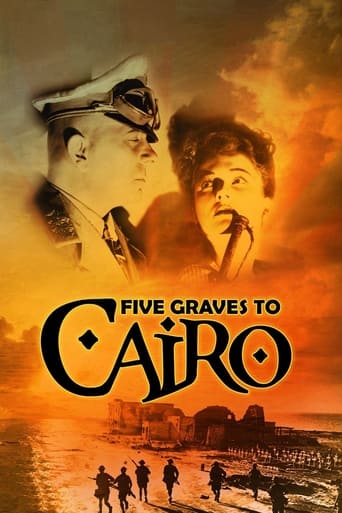
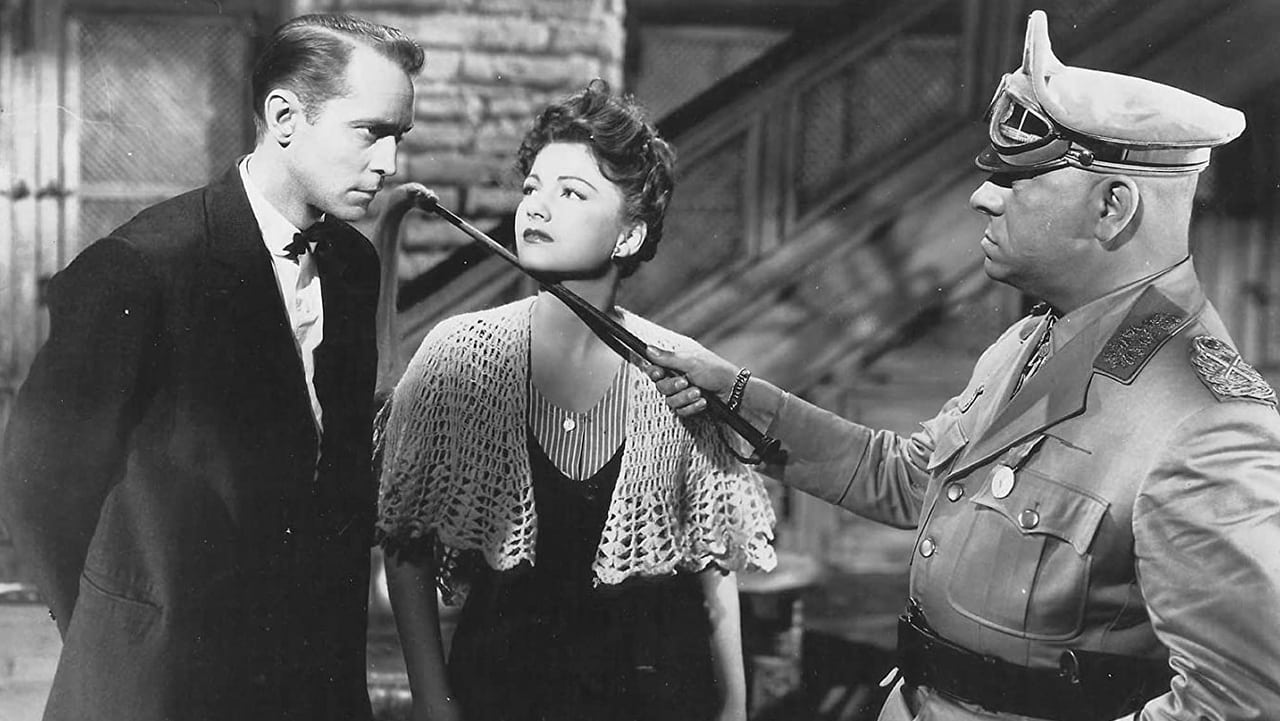
 AD
AD




